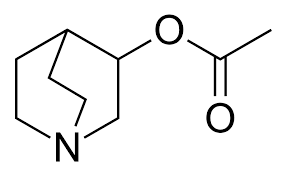
Buy Aceclidine Hydrochloride Online
Aceclidine Hydrochloride Price List:
Aceclidine Hydrochloride (1g) $350
Aceclidine Hydrochloride 3g) $800
Aceclidine Hydrochloride (5g) $1900
Aceclidine Hydrochloride (10) $3500
Maximum Quantity: 5kgs.
Technical Information
Formal Name: 1-azabicyclo[2.2.2]octan-3-ol, 3-acetate, monohydrochloride
CAS Number: 6109-70-2
Molecular Formula: C9H15NO2 • HCl
Formula Weight: 205.7
Purity: ≥95%
Formulation: A crystalline solid
Laboratory Procedures
For long term storage, we suggest that aceclidine (hydrochloride) be stored as supplied at -20°C. It should
be stable for at least two years.
Aceclidine (hydrochloride) is supplied as a crystalline solid. A stock solution may be made by dissolving the
aceclidine (hydrochloride) in the solvent of choice. Aceclidine (hydrochloride) is soluble in organic solvents
such as ethanol, DMSO, and dimethyl formamide, which should be purged with an inert gas. The solubility
of aceclidine (hydrochloride) in these solvents is approximately 30 mg/ml.
Further dilutions of the stock solution into aqueous buffers or isotonic saline should be made prior to
performing biological experiments. Ensure that the residual amount of organic solvent is insignificant,
since organic solvents may have physiological effects at low concentrations. Organic solvent-free aqueous
solutions of aceclidine (hydrochloride) can be prepared by directly dissolving the crystalline solid in aqueous
buffers. The solubility of aceclidine (hydrochloride) in PBS, pH 7.2, is approximately 10 mg/ml. We do not
recommend storing the aqueous solution for more than one day.
Description
Aceclidine is an agonist of muscarinic receptors (EC50 = 1.8-17 µM for human M2).1 It induces contraction
of iris sphincter muscle, resulting in miosis.2,3 Aceclidine has applications in glaucoma therapy and in basic
research regarding muscarinic receptor signaling.
